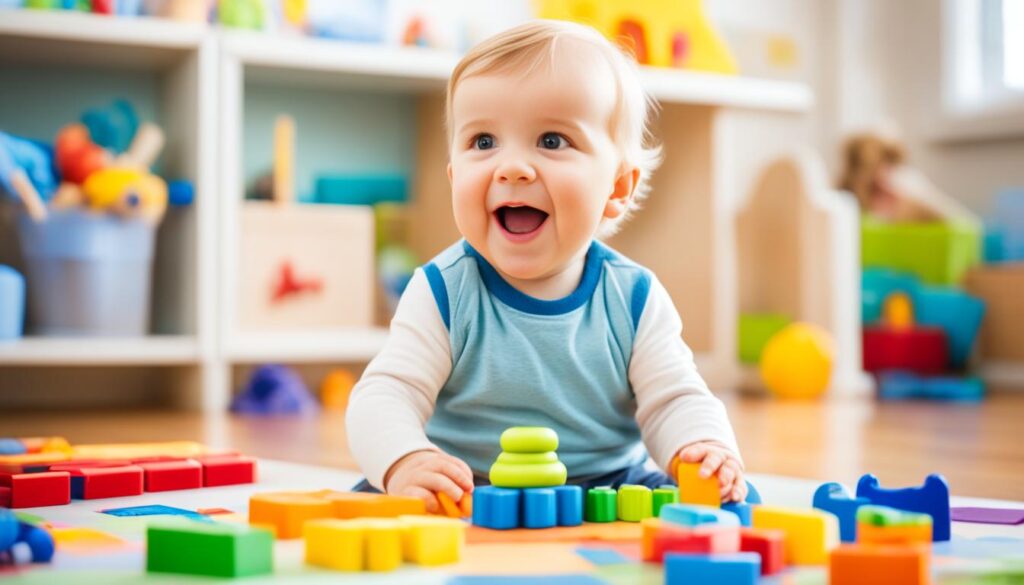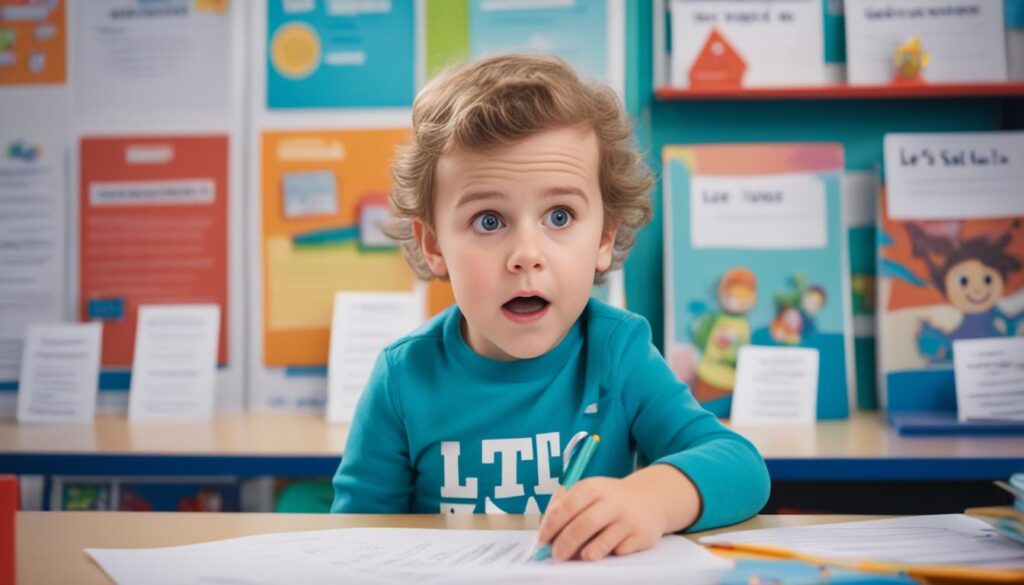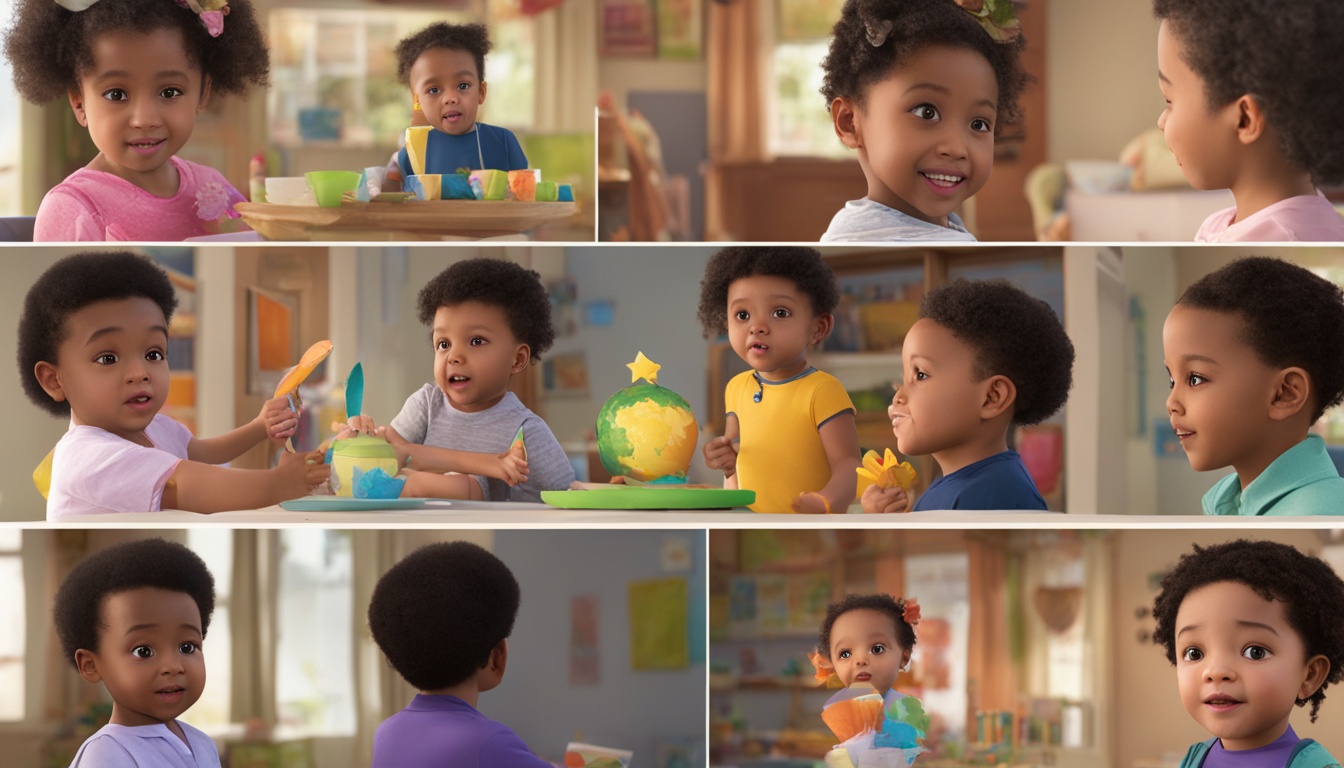Speech and language are key in a kid’s early growth. Many parents wonder if their child’s talk is doing okay or if speech therapy could help. This piece looks into why speech and language skills matter. And how to see if your child might need speech therapy.
We offer a quiz to check your child’s talking skill level. This helps find where your child might need extra help. Knowing about speech goals and possible problems lets you make good choices. These choices are for your child’s speaking better.
Key Takeaways
- Strong communication abilities are linked to academic success, social interaction, self-confidence, and emotional well-being.
- Speech and language skills are essential for future success in adulthood.
- Addressing speech and language difficulties early is crucial for effective intervention and support.
- Identifying potential speech and language delays through professional evaluation is important for determining the need for speech therapy.
- The “Does My Child Need Speech Therapy?” quiz can help assess your child’s communication skills and guide you towards the appropriate next steps.
The Importance of Speech Development
Speech development is key for several reasons. It’s vital for doing well at school and for connecting with others. Learning to speak well also helps avoid future issues related to communication.
Academic Success
Having good speech skills really helps in class. Kids who can communicate well do better in school tasks. They can also share their thoughts clearly and join in class discussions fully.
Social Interaction
Speech plays a big role in making friends. Kids who find speaking hard might not make as many friends. They may struggle to express how they feel or to understand others.
Self-Confidence
When children can talk about what they want or feel, it boosts their confidence. Feeling confident in talking also helps them see themselves in a positive light.
Emotional Well-being
Not being able to speak clearly can lead to emotional issues. Kids might feel frustrated, anxious, or even show bad behavior if they struggle with expressing themselves.
Future Success
Good speech skills matter for life, not just in school. They are vital for a good career and for making strong personal connections.
The “Does My Child Need Speech Therapy?” Quiz
Answer these questions honestly to check your child’s speech and language skills. Remember, this quiz can’t replace a professional’s advice. But if you say “yes” to many questions here, it’s wise to see a speech-language pathologist. They will look at different speech and language areas like how clear your child speaks and their frustration with talking.
Question 1: Is Your Child’s Speech Difficult to Understand?
Question 2: Does Your Child Have a Limited Vocabulary?
Question 3: Is Your Child Struggling with Grammar?
Question 4: Does Your Child Avoid Speaking?
Question 5: Does Your Child Stutter?
Question 6: Is Your Child Struggling to Follow Directions?
Question 7: Is Your Child’s Speech Development Significantly Behind Peers?
Question 8: Do You Have Concerns About Your Child’s Articulation?
Question 9: Does Your Child Seem Frustrated by Communication?
Question 10: Has Anyone (e.g., Teacher, Pediatrician) Expressed Concern About Your Child’s Speech?
Interpreting the Results
After finishing the quiz on does my child need speech therapy, look at how many “yes” answers you have. If you find 0 to 2 “yes” answers, your child is probably developing speech and language skills well for their age. More “yes” answers, 3 to 5, might point to mild worries about speech or language. In this case, it’s good to watch your child’s progress and maybe see a professional if the worries stay.
Finding 6 or more “yes” answers could mean there’s a bigger issue with speech or language. You should talk to your child’s doctor and maybe visit a speech therapist for a check-up. It’s important to know that each child grows at their own pace, and a little difference in speech is normal. But, if you’re worried about how your child talks or understands, talking to a speech-language pathologist is a great idea.
| Quiz Results | Interpretation |
|---|---|
| 0-2 “yes” answers | Typical speech development |
| 3-5 “yes” answers | Mild speech or language concerns |
| 6 or more “yes” answers | Significant speech or language disorder |
Does My Child Need a Speech Therapist
Is your child having trouble with speech? It’s key to look at how they’re developing in this area. We suggest talking to a speech-language pathologist. They can check your child’s speech and language skills. Then, they’ll tell you if your child needs extra help.
Professional Evaluation
Have teachers or daycare workers mentioned speech and language worries? Their feedback is important. They have lots of experience with kids. They can give you good advice on your child’s speaking and understanding skills.
Observations from Teachers and Other Professionals
Watch how your child feels about talking. Do they get upset or avoid conversations? This could mean they need speech therapy. Getting them help early can boost their confidence in talking.
Your Child’s Comfort and Confidence
Think about how speech issues impact your child’s day. Do they find school hard or struggle to make friends? If speech problems are causing big issues, a speech therapist might help.
Communication Impact
By thinking about these points, you can see if speech therapy is a good move. Starting early is best. For many kids, speech issues won’t just go away. With professional help, they can communicate more effectively.

Speech and Language Evaluation
A speech and language evaluation is a detailed test done by a speech therapist. This test aims to understand how well someone can talk and listen. It finds any problems in speech or understanding and makes a plan to help.
The process starts with a talk between the therapist and the person being evaluated. They get information about the person’s background and any known issues. This step is very important for spotting communication challenges.
Case History
Next, the therapist learns about the person’s past by asking many questions. They talk about development, health problems, or past struggles to communicate. Understanding these details helps in the evaluation process.
It gives a clearer picture of what could be causing the challenges. This way, the therapist can focus on finding the best way to help.
Observation
The therapist then watches how the person communicates. They look at how words are said, how language is used, and how clear communication is. They might watch during a chat, play, or when solving a task.
By observing the person, they can figure out what the person is good at and what they need help with. This way, the therapy program can be tailored to the person’s specific needs.
Standardized Speech and Language Assessment
Also, the therapist might use tests made for the person’s age. These tests look at speaking, understanding, and other language skills. They help the therapist understand the person’s strengths and areas needing development better.
After everything, the therapist puts together a plan that is just right for the person. This plan is designed to help improve the way the person talks and listens.
Does My Child Need Speech Therapy at Age 2?
Your child’s second birthday is a good time to watch their speech growth. By now, they should use single words or two-word phrases. If you’re seeing issues, speech therapy could be helpful.
Ask these questions about your two-year-old’s talking skills:
- Is your child smiling, cooing, and making other vocalizations to interact with you?
- Can your child use at least one word consistently to communicate their needs?
- Is your child babbling and experimenting with different sounds?
- Does your child engage in simple back-and-forth games, like peek-a-boo?
- Are there any concerns about your child’s feeding or texturing issues?
If you said “no” to any questions, think about talking to your doctor or a speech therapist. Getting help early is key. Many kids need professional support to overcome speech and language issues.
Every child grows differently, but keeping an eye on their speech is important. With early help, your toddler can improve their talking and do well.
Does My Child Need Speech Therapy From Age 3 to 5?
As your child gets closer to their 3rd birthday, keep an eye on their speech and how they use language. Children at this age should be hitting certain milestones. These milestones help them do well in school, make friends, and feel good about themselves. If you’re worried about your child’s talking and language skills, talk to a speech pathologist assessment for children.
Wondering if your child should try speech therapy exercises for toddlers? Here are some things to think about:
- Can others understand what your child is saying, or is it hard to figure out?
- Does your child like to pretend and play together with others?
- Can they follow simple directions and respond the right way?
- Does your child get upset or avoid talking to friends and grown-ups?
- Has their daycare provider or teacher said anything about their speech or language?
If you said “yes” to many questions, meeting a speech pathologist assessment for children might be a good idea. They can figure out if your child might need some help like speech therapy for kids. Getting help early is important because how well your child talks and understands influences their development and future.
Every child speaks and learns differently, and that’s normal. But if you’re concerned about your child’s communicative disorders in childhood, talking to a pro is smart. They can offer a detailed does my child need speech therapy quiz and recommend the best way to help your child talk and understand better.
Does My Child Need Speech Therapy From Age 6-8?
From 6 to 8 years old, it’s key to keep an eye on your child’s speech and language. Each child grows differently. But, watching for certain signs is crucial. These signs might show if your child needs speech therapy.
Look at how often your child stutters. If it’s happening a lot or affecting their daily life, therapy might help. Also, notice if they like playing with kids and if they can get others’ attention to talk. Trouble saying some words or understanding questions that start with “wh-” are also signs to watch for.
Another thing to check is how well your child talks about their day or any eating problems. If they seem upset or don’t talk much, it could mean they are having trouble with speech or language.
If you see these signs or are worried, talking to a speech-language pathologist is a good idea. They can check your child thoroughly. Then, they’ll make a plan to tackle any speech or language issues your child might have.
| Milestone | Potential Concern |
|---|---|
| Frequency of stuttering | Frequent or disruptive stuttering may indicate a need for speech therapy. |
| Interest in playing with other children | Disinterest or difficulty engaging with peers could signify a speech or language issue. |
| Ability to get attention | Struggling to get the attention of others when communicating may be a sign of a problem. |
| Mispronunciation of words | Persistent mispronunciation of words may require speech therapy intervention. |
| Understanding of “wh-” questions | Difficulty comprehending “wh-” questions could indicate a language delay. |
| Ability to discuss their day | Struggling to describe their day or experiences may signal a need for language support. |
| Disruptions to daily life due to feeding habits | Feeding difficulties that impact daily activities may require evaluation by a speech therapist. |
Every child is different, and they grow in their own way. Yet, if you’re worried about your child’s speech or language skills, seeking professional advice is wise. A speech-language pathologist can give you a detailed evaluation and suggest what to do next.

Does My Child Need Speech Therapy From Age 9-18?
Watching your child’s speech development is crucial, especially as they enter their preteen and teenage years. Older kids could face different challenges that show a need for speech therapy.
By the ages of 9 to 18, children should speak well, join in talks meaningfully, and deeply understand language. Yet, sometimes kids might have trouble talking or understanding what others say. This could mean they need speech therapy.
If you’re worried, here are some questions to ask yourself about your child:
| Question | Potential Concern |
|---|---|
| Does your child frequently stutter or have disruptions in their speech flow? | Persistent or worsening stuttering may indicate a need for speech therapy exercises for toddlers to improve fluency. |
| Is your child struggling to make and maintain friendships? | Difficulties with social communication and communicative disorders in childhood can impact a child’s ability to build and sustain relationships. |
| Does your child have trouble understanding “white lies” or nuanced language? | Challenges with pragmatic language (the social use of language) may require when to seek speech therapy for kids. |
| Does your child have difficulty focusing, following social cues in conversation, or expressing their thoughts clearly? | These issues can be related to underlying does my child need speech therapy quiz or language disorders. |
| Does your child struggle to comprehend complex stories or information? | Trouble with receptive language (understanding) may indicate a need for speech and language development milestones assessment and intervention. |
If you said “yes” to many of these questions, talking to a speech pathologist might help. They can check if your child could benefit from speech therapy. Acting early can greatly improve your child’s ability to communicate well.
Does my child need speech therapy quiz
Wondering about your child’s speech and language skills is normal. The “Does My Child Need Speech Therapy?” quiz aims to guide you. It helps you look at your child’s talking abilities. Then, it suggests whether getting a professional check-up is a good idea.
This quiz checks many parts of talking and using words. It looks at how clear your child’s speech is, the words they use, and if they avoid talking. It also asks about stuttering, how well they follow directions, and compares speech to other kids. Answering these questions honestly gives you insights into your child’s speech.
Keep in mind, this quiz can’t replace a complete check by a professional. Yet, it’s a useful first step. If you say “yes” to a lot of the questions, talking to a speech-language expert is wise. They can give your child a full check. Then, they might suggest a plan to help.
Understanding early talking skills is crucial. So, by spotting and tackling any speech problems soon, you’re supporting your child. It can make a big difference in how well they do in school and with friends.

What should you, the parent, look for?
It’s important to watch how your child talks and listens. This can show if there are any problems early. Understanding when your child should meet certain talking goals is key as they get older.
By the end of 6 months
When your baby is 6 months, they should smile and make sounds. They should also react to different noises. If they don’t, it might be time to talk to a speech and language expert.
By the end of 12 months
At 12 months, your child should start saying simple words like “mama”. They might copy sounds and words they hear. If not, it could be a sign they need extra help with their language.
By the end of 18 months
By 18 months, your child should say at least 20 words. They should also talk with you back and forth. If they aren’t, a speech expert can check if everything’s okay.
By the end of 24 months
At 24 months, your child should say 2-word phrases and follow simple directions. They should also start playing pretend. If they’re not doing this, it could be a good time for an expert to take a look.
By their 3rd birthday
By age 3, your child should speak in 3-4 word sentences and ask questions. They should also enjoy playing together with other kids. If they’re not at this stage, seeing a professional could be helpful.
By their 4th birthday
By 4 years old, kids should talk in full sentences and have conversations with you. They should understand a lot of what’s said to them. Getting help now if they don’t can be very important.
By their 5th birthday
By 5 years old, children should talk clearly and say more complex things. They should also like being around other people. If speech issues seem to linger, a visit to a speech and language expert is wise.
Keeping an eye on how your child talks and listens is key. Getting the right help at the right time can do a lot for their schooling and how they communicate. Every child grows at their own pace, but it’s wise to be cautious when you think something might be wrong with your child’s talking skills.
Can others understand what your child is saying?
As your child gets older, how well others understand them is key. This is called intelligibility, or how clear their words are. It’s vital for good communication. Knowing what speech milestones to look for helps. This way, you can tell if their speech is developing as it should.
By age 2, about half of what a child says should make sense to familiar people. Then, by age 3, this should go up to 75%. When they’re 4, almost anyone should understand about half of their speech, not just those they know well. At 5 years old, 75% of their words should be clear to anyone. And by age 7, nearly everyone should understand what they’re saying.
If your child’s speech isn’t hitting these marks, they might need help. Seeing a speech therapist could be a good idea. They’ll figure out what’s causing the speech issues. Then, they can create a plan to boost your child’s ability to talk clearly. It’s best to start early. This can really help your child do better in school, with friends, and how they feel.
What is the definition of a “late talker”?
A “late talker” is a toddler between 18 and 30 months. They understand language well but speak few words for their age. Compared to other kids, they might speak later and have a smaller vocabulary.
Signs a child might be experiencing a language delay
Here are some signs of a language delay in children:
- Being relatively quiet as an infant, with limited cooing or babbling
- Having a history of recurrent ear infections, which can affect language development
- Using a limited number of consonant sounds in their speech
- Difficulty with pretend play and imitation of others
- Relying more on nouns (names of objects) than verbs (action words) to communicate
Some children naturally catch up and start speaking more after being late talkers. Others might need speech therapy to help them catch up and avoid long-term issues.
What to do if your toddler is a late talker
If your toddler doesn’t talk much and has possible risk factors like family history of speech issues, consult a speech expert. Even if some late talkers catch up by themselves, they might still have language difficulties later.
The Centers for Disease Control and Prevention (CDC) say 1 in 12 kids has a speech problem. Sadly, almost half of these kids don’t get the help they need, like speech therapy. Starting help early is key because speech problems don’t always go away on their own. And, it gets harder to fix these issues as time goes on.
It’s important to start therapy with a qualified speech therapist early. This can lead to quick improvements, help your child meet their developmental milestones, and do better in school. Help is not just for kids, but for people of all ages looking to improve how they communicate.
What if your child catches up on their own?
Even if your child is a “late talker” but starts catching up without help, they might still have trouble with grammar later. This is why it’s a good idea to consider speech therapy. It could be very helpful, even for those who are catching up by themselves.
Some kids do improve on their own with talking over time. But, it’s wise for parents to get them help just in case. A parent’s feeling about their child’s needs is usually right.
Research indicates that getting speech therapy is still a good move. It may help with any lasting language issues, like grammar problems. This is even if a child is already showing improvement in their speech.
| Statistic | Percentage |
|---|---|
| Children in the U.S. with a speech, language, or swallowing problem | Around 8% |
| Children with speech problems related to articulation | 5% |
| Children with language problems related to understanding and using words and sentences | 3.3% |
| Children in the United States with a delay in communication abilities | Estimated 1 in 12 |
Remember, early speech therapy can speed up progress and lessen the delay’s impact. It’s better to be safe and get your child the help they may need. This is true even if they’re starting to talk better on their own.
Conclusion
Early speech and language growth are vital for a kid’s success in many areas. This means they are important for school, making friends, and how they feel overall. Parents can help a lot by knowing how to improve their child’s way of talking.
The quiz on speech therapy in this article is helpful. It helps you see how well your child speaks and if they might need help. If you answer truthfully, you can understand if a professional’s opinion might be good for your child.
If your child starts talking late, don’t worry but do consider seeing a speech therapist. Studies show these children might have language problems later, like understanding grammar. Getting help early can really change things for your child.
It’s all about keeping an eye on how your child talks, being ready to get help, and working with the right people. Doing these things can help your child beat many speech or language hiccups. This means your child can do well in school, make friends, and be happy.
FAQ
What is the importance of speech development?
Good communication is key to doing well in school and making friends. It’s important to catch and fix speech problems early. This can help kids do better at school, make friends, and grow more confident.
What is the “Does My Child Need Speech Therapy?” quiz?
The quiz helps parents check their child’s talking skills. It looks at things like clear speech, knowing many words, and how easy talking is for your child. The quiz can suggest if you might need to see a pro about it.
How can I interpret the results of the “Does My Child Need Speech Therapy?” quiz?
If your child gets 0 to 2 ‘yes’ bits, their speech may be fine. 3 to 5 ‘yes’ bits could mean some small problems. Six or more ‘yes’ bits might point to bigger speech problems.
It’s important to talk to a pro if you’re worried.
What factors should I consider when determining if my child needs a speech therapist?
Think about what the pros say and how your child feels. If talking causes stress or affects everyday life, it might be time to see a specialist.
What happens during a speech and language evaluation?
A speech check means a speech therapist checks how well someone talks. They use tests and watch the person talk. Then they suggest a plan to help if it’s needed.
What are the signs that a 2-year-old child may need speech therapy?
At 2, some signs might be missed. If your child doesn’t babble, use words, or play simple games, it could be a red flag.
What are the signs that a child between 3 and 5 years old may need speech therapy?
For kids 3 to 5, trouble with clear speech or not playing pretend might show a need for help. It’s important if they don’t follow simple directions or share things with others.
What are the signs that a child between 6 and 8 years old may need speech therapy?
For older kids, if words are often jumbled or confusing, they might need therapy. This can also be true if they have trouble talking about their day or if they’re not making friends.
What are the signs that a child between 9 and 18 years old may need speech therapy?
Older kids might still have speech issues. This could show as trouble making friends or understanding lies. If kids have problems expressing themselves, speech therapy could help.
What should I, as a parent, look for in my child’s speech and language development?
Look for your child smiling, using words, and understanding you. If they can follow simple directions and play with toys, this is good progress. Keep checking their growth in speaking and understanding.
How can I determine if others can understand what my child is saying?
A formula and knowing your child’s age help you check speech progress. It can tell you if others understand most of what your child says or not.
What is the definition of a “late talker”?
A “late talker” is a toddler, 18 to 30 months old, with good understanding but limited speech. It’s not about just being a bit behind in talking.
What should I do if my toddler is a late talker?
If your child is a late talker and has risk factors for lasting speech issues, see a specialist. While some kids catch up, a pro can help with potential language problems that might stay.
What if my child catches up on their own without intervention?
If your late talking child eventually catches up, they may still have language issues. It’s best to get a pro look at it. Speech therapy can help fix any lasting problems.








